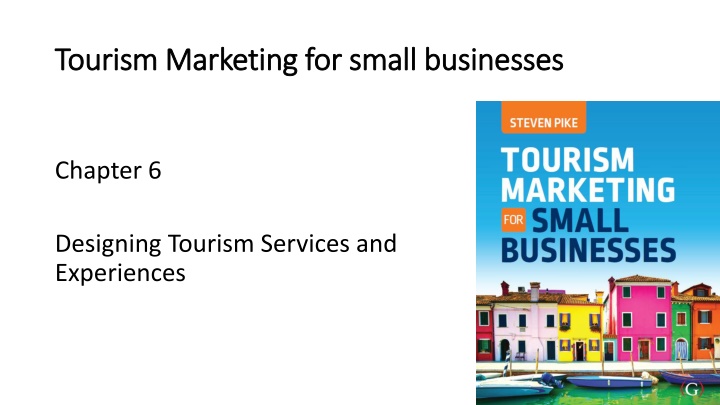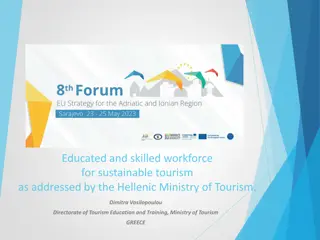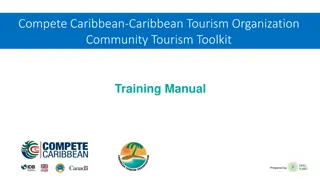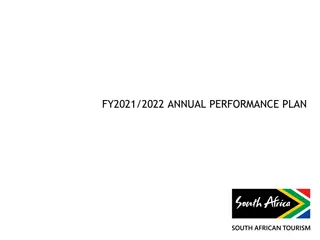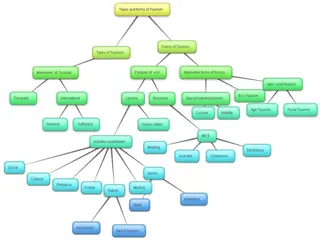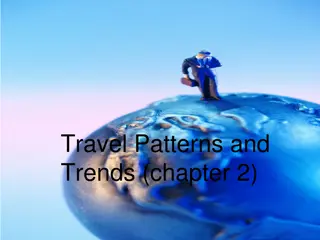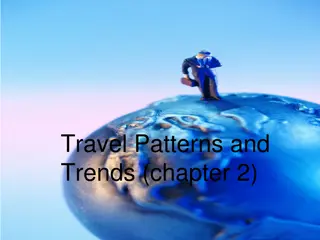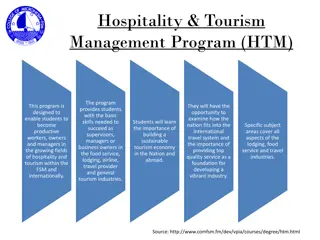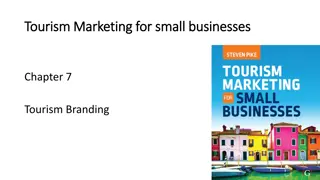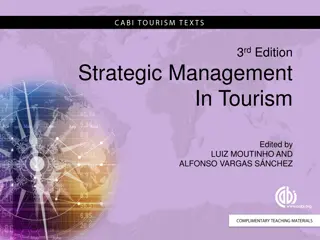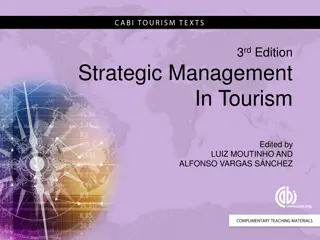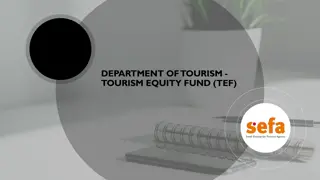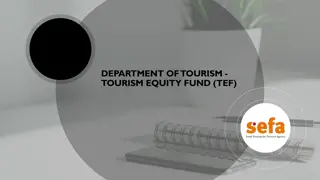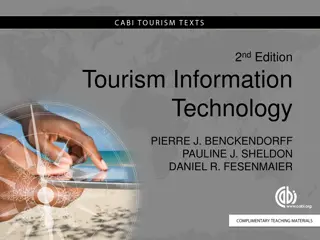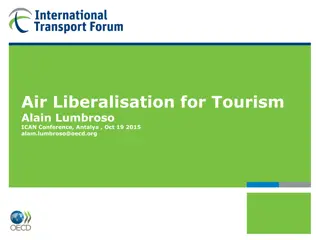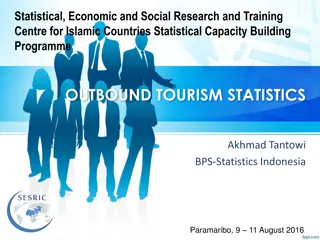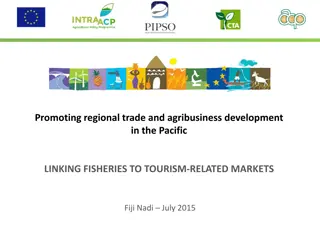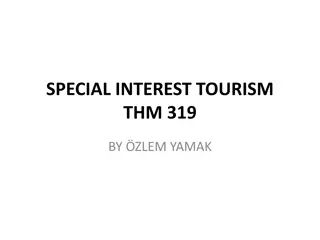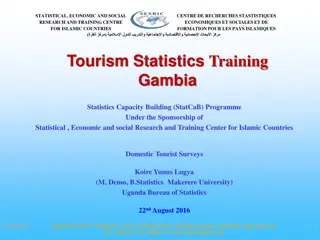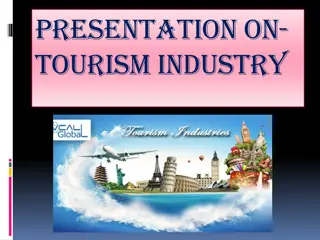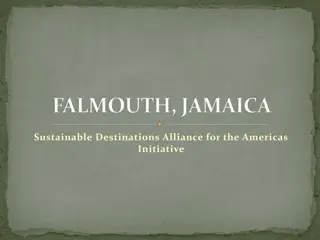Enhancing Tourism Services through Co-Creation and Memorable Experiences
Explore the essence of service value co-creation in the tourism industry, transitioning to the experience economy, and designing engaging experiences for customers. Learn about the pivotal role of frontline staff, utilizing intangible resources, and empowering employees for superior customer engagement. Delve into service-dominant logic, the importance of people, and watch a video on service-dominant logic basics by Prof. Stephen Largo. Uncover examples of tourism services and elevate your understanding of creating memorable experiences in tourism businesses.
Download Presentation

Please find below an Image/Link to download the presentation.
The content on the website is provided AS IS for your information and personal use only. It may not be sold, licensed, or shared on other websites without obtaining consent from the author.If you encounter any issues during the download, it is possible that the publisher has removed the file from their server.
You are allowed to download the files provided on this website for personal or commercial use, subject to the condition that they are used lawfully. All files are the property of their respective owners.
The content on the website is provided AS IS for your information and personal use only. It may not be sold, licensed, or shared on other websites without obtaining consent from the author.
E N D
Presentation Transcript
Tourism Marketing for small businesses Tourism Marketing for small businesses Chapter 6 Designing Tourism Services and Experiences
Chapter learning aims Chapter learning aims To enhance your understanding of: service value as being co-created by the customer and the service provider the challenges in transitioning to the experience economy the key characteristics of memorable experiences
Key terms Key terms Service An interactive process of doing something for someone, which they value. Service-dominant logic A philosophy viewing service value as being co-created by the service provider together with the customer. The experience economy A paradigm shift recognising the need to evolve from providing a service to staging an experience. The challenge in the experience economy is to design an engaging experience that represents a memorable event for the customer, and commands a price premium for the business.
The importance of people The importance of people Frontline staff are the stars of the show But usually the lowest paid A competitive edge can be gained by using operant resources (intangible skills and knowledge) to engage with consumers in a way that is superior to how competitors use their resources Empower staff to use their own best judgement Culture eats strategy for breakfast (Peter Drucker)
Service Service- -dominant logic dominant logic Tourism is mostly in the form of intangible services Service can take place before, during and after purchase and consumption Service is the act of doing something for someone, which they value S-D logic is underpinned by the co-creation of value The business provides a value proposition (eg cheaper, faster, better) The customer decides if value proposition was delivered
Video link Video link Prof. Stephen Largo: Service-dominant logic. Basics, developments and state-of-the-art https://www.youtube.com/watch?v=J1h4JQ7bTmA
Examples of tourism service co Examples of tourism service co- -creation creation The business model of low cost airlines relies on the customer self- booking their own flights via the internet and then benefitting from discounted fares (see Mintel, 2005). Travel itinerary management platforms, such as TripIt.com, which enable the user to consolidate different bookings into one master itinerary (see Applegate, Piccoli & Brohman, 2008).
Examples of tourism service co Examples of tourism service co- -creation creation Repeated trial and error product testing and experimentation with a new in-room entertainment system in a few guestrooms. Undertaken with regular guests who were briefed on the initiative on arrival, and then subsequently interviewed at checkout. Development of a multi-sensory dining experience, where guests are seated back stage to witness the skill involved in preparing their menu. Guest are also able to interact with the kitchen staff, and subsequently offer suggestions. Customer survey feedback is scrutinised, and then used to structure focus group meetings with key clients. Clients are given two nights accommodation and wined and dined in return for four hours of focus group work .
Disruption Disruption Disruption is not a new phenomenon Throughout history, industries have been revolutionised through the advent of new technology Eg the steam engine, railroads, electricity, the telephone, jet aircraft What is different in the digital age is the rapid speed at which new technologies can lead to disruption
Being non Being non- -customer centric is the threat customer centric is the threat Amazon did not kill the retail industry. They did it to itself with bad customer service. Netflix did not kill Blockbuster. They did it to itself with ridiculous late fees. Uber did not kill the taxi business. They did it to itself with limited the number of taxis and fare control. Apple did not kill the music industry. They did it to itself by forcing people to buy full-length albums. Airbnb did not kill the hotel industry. They did it to itself with limited availability and pricing options. Technology by itself is not the real disruptor. Being non-customer centric is the biggest threat to any business. Source: Alberto Brea, 2017 https://www.linkedin.com/pulse/amazon-did-kill-retail-industry-alberto-brea
Disruption (creative thinking) is harder than Disruption (creative thinking) is harder than critical thinking critical thinking An ideal innovation is one that will cause minimal disruption to the firm, but maximum disruption in the market. Creativity is a delicate process, so avoid any criticism during the brainstorming phase. Generate as many ideas at possible without judgement. Take the most glaring flaw facing you and flip it. Zipcar.com identified the processing required at rental car offices as the defining negative characteristic in that market, so their business model was based on removing the office from the hire process. Assume transformation is necessary, ask transformational questions (the hardest part of the process), and try to forget what you know (eg entrenched paradigms). Address the how as well as the wow, by thinking money and magic. Money focuses on the business questions to generate profit, while magic focuses on the needs of the customer.
The experience economy The experience economy Increasingly competitive markets crowded with similar service offerings has led to recognition of the need to evolve from providing a service to delivering an experience An experience takes place when a business uses its services as a theatrical stage The challenge is to design an engaging experience that represents a memorable event for individual guests, and commands a price premium for the business.
Consumers dont always know what they want Consumers don t always know what they want to satisfy a need to satisfy a need Yes, services need to be designed based on consumer s needs But, consumers wants are limited by their imagination Therefore, revolutionary product never emerge from only listening to consumers wants
Video link Video link Joseph Pine: What consumers want https://www.ted.com/talks/joseph_pine_on_what_consumers_want Joseph Pine: The experience economy https://www.youtube.com/watch?v=pXv3cfvJ9F8
Designing memorable experiences Designing memorable experiences 1. Theme the experience A clear, focussed and compelling theme drives all the design elements and staged events Eg Cat poo coffee, Bali Eg Cat cafes Eg Jimmy Buffet s Margaritaville Eg Theme parks
Designing memorable experiences Designing memorable experiences 2. Harmonise impressions with positive cues Impressions are what the guest takes away from the experience, and fulfil the theme Visual and cues, supporting the theme, need to be introduced to the guest to affirm the nature of the experience Eg staff in period costume First impressions are important
Designing memorable experiences Designing memorable experiences 3. Eliminate negative cues Eliminate anything that distracts the guest from the theme Clutter such as excessive signage or notices Unnecessary messages Poor service
Designing memorable experiences Designing memorable experiences 4. Mix in memorabilia A memento of an experience sells for a premium The price point is related to the value the guest places on the experience, rather than the cost of the item But mementoes don t have to be expensive
Designing memorable experiences Designing memorable experiences 5. Engage the senses The more senses that are engaged (related to the theme), the more memorable the experience Create a sense of arrival Eg Pitch black restaurants Eg Hotel reception located in Casino gaming room
Discussion questions Discussion questions Why is it important for a firm to not base all future service and experience designs on what consumers say in focus group research? Why do many creative new product ideas fail commercially? While Pine and Gilmore suggested the transition from the service economy to the experience economy would be difficult, why might small tourism businesses hold an advantage over the big travel brands in this regard?
